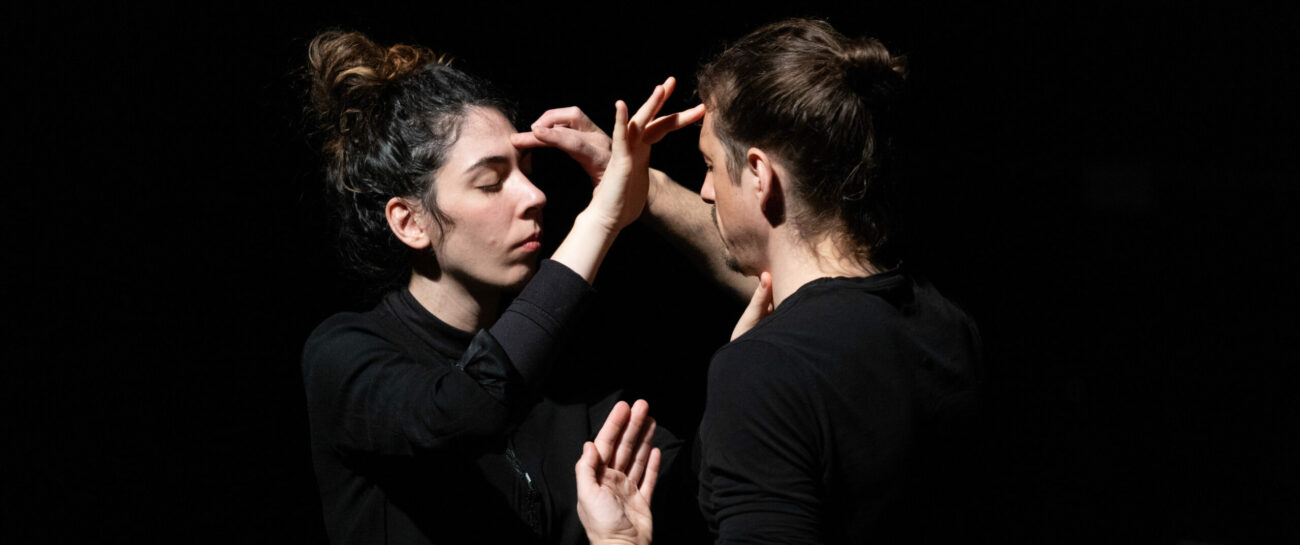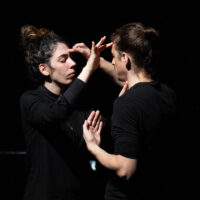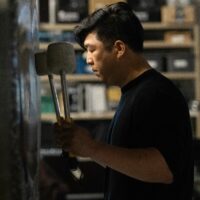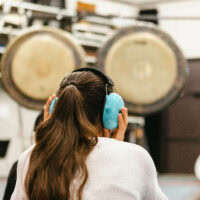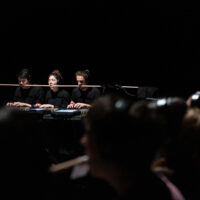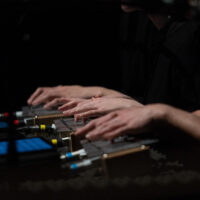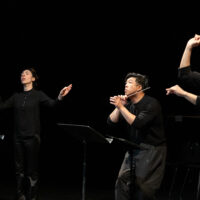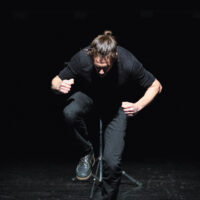Simon Løffler, C (2013)
Mark Applebaum, Tlön (1995)
Jeppe Ernst, Offertorium : Behandling A (2018)
Dieter Schnebel, Poem für einen Springer (1989)
James Tenney, Having never written a Note for percussion (1971)
Michael Beil, Key Jack (2017)
Performers: Lou Renaud-Bailly, Pin-Cheng Chiu, Hyoungkwon Gil, Matthieu Benigno
Executive production: Festival Musica
The project was supported by Demathieu Bard Initiatives.
Duration: performance about 1h10 and discussion 20 min.
In the form of a “listening laboratory”, an experiment was carried out at Musica in 2019 aimed at sharing different pieces of music – with a visual, physical or vibratory dimension – between deaf, hard-of-hearing and hearing people. The aim was to raise public awareness of listening in all its forms, and particularly non-cochlear listening, in order to better deconstruct stereotypes and apprehensions about sound perception.
Musica, in collaboration with Les Percussions de Strasbourg, is taking this sensory journey, inspired and nourished by deaf culture, and turning it into a concert-experience.
Simon Løffler, C (2013)
A piece for three musicians to listen to with their teeth
Simon Løffler’s installations often call into question the relationship with the audience, as is the case with his piece ‘C‘, to be listened to with one’s teeth. Wearing headphones that make it impossible to perceive sound from the air, the performers and audience hear the music only through bone conduction, using a wooden stick squeezed between the jaws. A complete and unexpected listening experience!
Mark Applebaum, Tlön (1995)
Visual piece for 3 conductors without musicians
In this audacious composition for three conductors without musicians, the rhythm is underlined not by the instruments but by the choreography of the bodies. According to the composer, “this silent but highly gestural piece requires mad skills combined with an open mind and a sense of humour”.
Jeppe Ernst, Offertorium: Behandling A (2018)
Tactile piece for a male and female musician
Offertorium is a tactile piece composed for a male and female musician. The duo face each other and play with each other’s faces in total silence, putting deaf and hearing people on an equal footing. The performers keep their eyes closed throughout.
“When I saw the two people start to touch each other, instantly it was like a melody came into place. I don’t know what it was, I couldn’t sing it for you, but this is what I perceived”. Michel, deaf spectator
“I thought the silence was marvellous and that perhaps for once I was experiencing silence, the beauty of the gesture without the sound, without the music, the infinitesimal perception that is difficult to hear…”. Nicolas, hearing spectator
Dieter Schnebel, Poem für einen Springer (1989)
Evocative piece for a musician
Poem für einen Springer (poem for a jumper) is part of the Zeichen-Sprache (German sign language) series composed between 1987 and 1989. These are short pieces of music for gesture and voice, for one to ten performers.
James Tenney, Having never written a Note for percussion (1971)
Vibratory piece for one percussionist
Having Never Written a Note for Percussion is a performance dedicated to the tam-tam. The piece takes the form of an immense, intensive arch that stages the continuous vibration of a tremolo. The resonant properties of the instrument are exploited to introduce people to vibratory listening. As you walk around the instrument, you are free to experience the vibrations as you wish.
“I was able to make my own music because I could touch the tam-tam for a long time, and then do short beats and then long beats. I tried to do a bit of what I wanted with one finger, two fingers, three fingers, four fingers, the whole hand, and then I felt the vibrations in different ways, more and more intense or less and less intense”. Chantal, deaf spectator
“I can still feel it pulsing in my hand, my blood circulation accelerated, the vibratory aspect was very strong in my body, and you just want to be in contact with the ground – several people took off their shoes – it’s a truly integral experience!” Jonas, a hearing spectator.
Michael Beil, Key Jack (2017)
Visual piece for a pianist without a piano
For years, Michael Beil has been deconstructing the image of the musician and his instrument. In Key Jack, it is the piano itself that has disappeared from the stage. Once a soloist, the pianist is assisted by two strange doubles. Facing the camera, she has to playback. The composer skilfully recombines movement, image and sound. The result is a fascinating performance that almost makes you forget that the piano isn’t there.
Dates :
16, 17, 18, 19 April 2024 – concerts for schools- Festival Musica, Théâtre de Hautepierre, Strasbourg
5 October 2024 – Festival Musica, L’Agora, Metz

